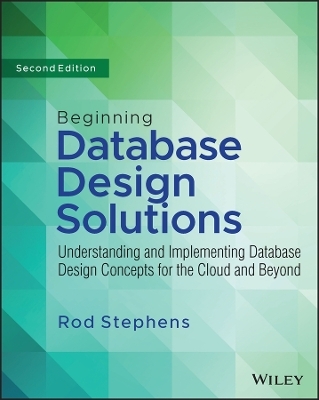
Beginning Database Design Solutions
John Wiley & Sons Inc (Verlag)
978-1-394-15572-9 (ISBN)
In the newly revised second edition of Beginning Database Design Solutions: Understanding and Implementing Database Design Concepts for the Cloud and Beyond, Second Edition, award-winning programming instructor and mathematician Rod Stephens delivers an easy-to-understand guide to designing and implementing databases both in and out of the cloud. Without assuming any prior database design knowledge, the author walks you through the steps you’ll need to take to understand, analyze, design, and build databases.
In the book, you’ll find clear coverage of foundational database concepts along with hands-on examples that help you practice important techniques so you can apply them to your own database designs, as well as:
Downloadable source code that illustrates the concepts discussed in the book
Best practices for reliable, platform-agnostic database design
Strategies for digital transformation driven by universally accessible database design
An essential resource for database administrators, data management specialists, and database developers seeking expertise in relational, NoSQL, and hybrid database design both in and out of the cloud, Beginning Database Design Solutions is a hands-on guide ideal for students and practicing professionals alike.
ROD STEPHENS is a professional programmer, sought-after technical speaker, instructor, and author. He’s written 37 books and over 250 magazine articles on C#, Java, and other programming languages. He runs the popular C# Helper and VB Helper websites which have helped millions of programmers with tips, tricks, and useful example code.
Introduction xxv
Part 1: Introduction to Databases and Database Design
Chapter 1: Database Design Goals 3
Chapter 2: Relational Overview 29
Chapter 3: NoSQL OVERVIEW 47
Part 2: Database Design Process and Techniques
Chapter 4: Understanding User Needs 83
Chapter 5: Translating User Needs Into Data Models 111
Chapter 6: Extracting Business Rules 145
Chapter 7: Normalizing Data 163
Chapter 8: Designing Databases to Support Software 203
Chapter 9: Using Common Design Patterns 215
Chapter 10: Avoiding Common Design Pitfalls 241
Part 3: a Detailed Case Study
Chapter 11: Defining User Needs and Requirements 263
Chapter 12: Building a Data Model 283
Chapter 13: Extracting Business Rules 303
Chapter 14: Normalizing and Refining 313
Part 4: Example Programs
Chapter 15: Example Overview 327
Chapter 16: MariaDB IN PYTHON 339
Chapter 17: MariaDB IN C# 355
Chapter 18: PostgreSQL IN PYTHON 369
Chapter 19: PostgreSQL IN C# 389
Chapter 20: Neo4j AuraDB IN PYTHON 401
Chapter 21: Neo4j AuraDB IN C# 417
Chapter 22: MongoDB ATLAS IN PYTHON 431
Chapter 23: MongoDB ATLAS IN C# 453
Chapter 24: Apache Ignite in Python 467
Chapter 25: Apache Ignite in C# 477
Part 5: Advanced Topics
Chapter 26: Introduction to Sql 489
Chapter 27: Building Databases with Sql Scripts 519
Chapter 28: Database Maintenance 533
Chapter 29: Database Security 545
Appendix A: Exercise Solutions 557
Appendix B: Sample Relational Designs 649
Glossary 671
Index 683
| Erscheinungsdatum | 01.04.2023 |
|---|---|
| Verlagsort | New York |
| Sprache | englisch |
| Maße | 185 x 231 mm |
| Gewicht | 1225 g |
| Themenwelt | Mathematik / Informatik ► Informatik ► Netzwerke |
| ISBN-10 | 1-394-15572-7 / 1394155727 |
| ISBN-13 | 978-1-394-15572-9 / 9781394155729 |
| Zustand | Neuware |
| Haben Sie eine Frage zum Produkt? |
aus dem Bereich


